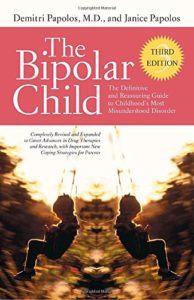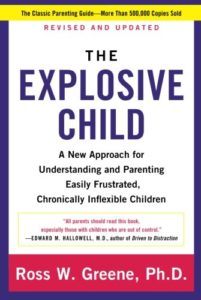Bipolar Disorder and Mood Dysregulation in Children and Teens
Moodiness, tantrums, irritability, and drama… normal experiences for children and teens or the signs of mental health issues that need intervention? Childhood and adolescence are developmental periods in which some children have generally smooth sailing with only occasional bumps in the road. Others, however, seems to have turbulence in their mood, self-concept, relationships, and behavior that are not only disruptive, but sometime are self-defeating and self-destructive. I have no intent to pathologize or give a diagnostic label the developmental period of transitioning into adulthood. There are many people who have had choppy teenage years and then “turned out just fine.” The problem is that for some children these stormy teenage years lead to enough distress and impairment that treatment is needed. In fact, not identifying that these children have a mood disorder such as Bipolar Disorder or Disruptive Mood Dysregulation Disorder can be harmful for the child and their long-term success. Parents, families, and teachers often find these children to be very challenging and are often exasperated by them. Christian parents sometimes have difficulty seeing that there is a diagnosable and treatable syndrome going on under the behavior. That is, they see the child’s behaviors as dramatic, rebellious, and sinful, but do not recognize that there may be another component to the puzzle. Having your child or teen assessed for these conditions and getting educated about the best options for parenting these struggling children/teens is key for both the parents and the children.
- Bipolar Disorder in Children and Teens: Bipolar disorder is a biologically based condition in which individuals have both manic episodes and depressive episodes. At times, these individuals may have mixed episodes in which they have both symptoms of mania and depression simultaneously. Symptoms of bipolar disorder in children and teens often presents with extreme mood swings and emotional intensity, depression, anxiety, anger/irritability, impulsivity, and social problems.
- Disruptive Mood Dysregulation Disorder (DMDD): According to the NIMH, children between the age of 6-18 who meet the following criteria may have DMDD.
-
- Irritable or angry mood most of the day, nearly every day.
- Severe temper outbursts (verbal or behavioral) at an average of three or more times per week that are out of keeping with the situation and the child’s developmental level.
- Trouble functioning due to irritability in more than one place (e.g., home, school, with peers).
- These symptoms last steadily for 12 months or more.
For Further Information:
Juvenile Bipolar Research Foundation
The JBRF provides information for families and mental health professionals on the diagnosis and treatment of bipolar disorder in children and teens.
Bipolar Disorder in Children and Teens This link from the National Institute of Mental Health explains the diagnosis of bipolar disorder, how it may manifest in children and tends, and provides options for treatment.
Disruptive Mood Dysregulation Disorder This link from the National Institute of Mental Health explains the diagnosis of Disruptive Mood Dysregulation Disorder, how it is similar to and distinct from bipolar disorder and provides options for treatment.
Screening Tools:
Mental Health Screening Center
At this link you can take free, confidential screening checklists for depression, anxiety, and mania. [Depression and Bipolar Support Alliance]
The Child Bipolar Questionnaire
At this link parents can take a free, CBQ questionnaire that can be printed out and taken to an appointment with a professional who is assessing the child/teen OR parents can complete the CBQ and have it automatically scored and interpreted for a fee.
Books
 The Bipolar Child
The Bipolar Child ![]()
Authors: Demitri Papolos, MD, Janice Papolos
This 480-page book is a resource for parents whose children suffer from early onset bipolar disorder. It provides information on how to obtain an accurate diagnosis and get the proper treatment. Suggestions for parenting a bipolar child and how to interact with school officials are provided.
 The Bipolar Teen
The Bipolar Teen ![]()
Authors: David Miklowitz and Elizabeth George
This 356-page book provides the practical information the parents and families need to understand bipolar disorder in teens, learn how to find and navigate treatment options, and manage the intense moodiness that their children exhibit.
 The Explosive Child
The Explosive Child ![]()
Author: Ross W. Greene, Ph.D.
This 304-page book addresses the treatment of kids with social, emotional, and behavioral challenges. These kids aren′t attention-seeking, manipulative, or unmotivated, and their parents aren′t passive, permissive pushovers. Rather, explosive kids are lacking some crucial skills in the domains of flexibility/adaptability, frustration tolerance, and problem solving, and they require a different approach to parenting.
Support Options
988 Suicide & Crisis Lifeline
This Lifeline is for people experiencing a crisis and is available 24/7 in the United States. If you need help for yourself, a friend, or family member, call or text 988 right away.
Support Options from NAMI
The National Alliance on Mental Illness (NAMI) provides education and support for people struggling with mental illness and their families. This site has links to find NAMI support groups in your local area. NAMI also provides 12-week Family-to-Family education groups that can be very helpful for family members of someone dealing with mental illness.
Find a Depression and Bipolar Support Alliance Group Near You
This site provides information related to peer-run support groups for people dealing with depression and bipolar disorders. [dbsalliance.org]





Comments
Leave a Comment